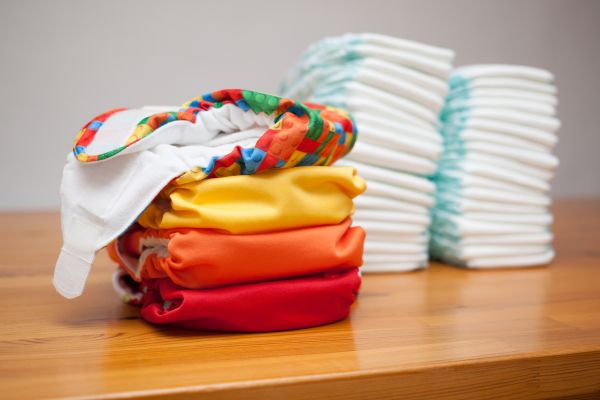When it comes to diapering your baby, one of the biggest questions parents face is this: cloth vs disposable diapers — which one should you go for? Every parent wants what’s best for their baby (and their sanity), but this debate has been going on for decades. Both options have their loyal fans and their fair share of critics. The truth? There’s no one-size-fits-all answer. But let’s break it down together and see what really matters for you and your baby.
Understanding the Basics
Before we dive deep, let’s get clear on what we’re comparing. Cloth diapers are made from natural fabrics like cotton, bamboo, or hemp, and they’re reusable after washing. Disposable diapers, on the other hand, are made from synthetic materials and are designed to be used once and thrown away. Sounds simple, right? But beneath the surface, there’s a lot to consider — cost, convenience, comfort, and even the environment.
The Cost Factor: Saving or Spending?
Let’s be real — babies go through a lot of diapers. Like, thousands of them before they’re potty trained. If you’re using disposables, that’s a constant expense that adds up quickly. On average, parents can spend anywhere from $1,500 to $2,500 on disposable diapers before their child turns three.
Cloth diapers, however, are a one-time investment. You might spend $300 to $700 upfront, but they can last for years — and even be reused for another baby. Sure, you’ll have laundry costs, but they’re still usually cheaper in the long run.
The thing is, if you value convenience more than savings, the upfront cost of cloth diapers might not feel worth it. But if you’re planning for the long haul and want to cut down recurring expenses, cloth diapers win the money battle hands down.
Convenience and Lifestyle
Now, here’s where disposable diapers often take the lead. Let’s face it — disposables are just easier. You use them, toss them, and move on. They’re perfect for busy parents, daycare use, or when you’re traveling. No extra laundry, no hassle.
Cloth diapers, while eco-friendly, require commitment. You’ll be washing them regularly, and if you’re not careful with cleaning, they can develop smells or even diaper rash issues. That said, modern cloth diapers have come a long way. Many come with snap buttons, waterproof covers, and absorbent inserts that make them just as easy to use as disposables — minus the trash.
It really depends on your daily routine. If you’re home most of the time and don’t mind laundry, cloth can fit in nicely. But if you’re always on the go, disposable diapers might feel like the practical choice.
Comfort and Skin Health
Every parent’s worst nightmare? Diaper rash. Babies have sensitive skin, and what touches them for hours matters. Cloth diapers are made from soft, breathable fabrics, which can be gentler on the skin. They allow better air circulation and reduce the chance of irritation from chemicals.
Disposable diapers, though super absorbent, often contain gels, dyes, and fragrances. While most are tested safe, some babies can react to these materials. That said, disposable brands now offer hypoallergenic and fragrance-free options that are much gentler than they used to be.
So, in the comfort category, it’s a bit of a draw. Cloth wins for natural feel, but disposables can be better at keeping moisture away from the skin — which also helps prevent rashes.
Environmental Impact
Ah, the big one. If you’re thinking green, the cloth vs disposable diapers debate can get tricky. On the surface, cloth diapers seem more eco-friendly because they’re reusable. No piles of diapers sitting in landfills for hundreds of years.
But here’s the catch — cloth diapers need regular washing, which means water and energy use. If you’re using a dryer, that adds more electricity. So the environmental impact depends on how you wash and dry them.
Disposable diapers, meanwhile, contribute tons of waste each year. Most aren’t biodegradable, meaning they’ll stick around long after your baby’s out of diapers. Some brands have started making eco-friendly or compostable disposables, but they’re still not perfect.
If you’re eco-conscious and use cloth efficiently — like washing full loads in cold water and line-drying — they’re usually the greener choice overall.
The Practical Middle Ground
Here’s something a lot of parents end up doing: using both. That’s right — you don’t have to pick one forever. You could use cloth diapers at home (where it’s easy to wash and change often) and disposables when traveling or at night.
This combo approach gives you flexibility, saves money, and still reduces waste compared to using only disposables. Plus, it can help you figure out what really works best for your baby’s comfort and your lifestyle.
Real Talk: What Other Parents Say
If you scroll through parenting forums or chat with experienced moms and dads, you’ll hear a mix of opinions. Some swear by cloth diapers, saying their babies never had rashes and they love the cute prints. Others can’t imagine dealing with extra laundry or carrying used diapers around.
At the end of the day, it’s about what makes your life easier — and keeps your baby happy. There’s no parenting trophy for choosing one over the other. It’s okay to switch things up or even change your mind down the road.
Final Verdict: It’s About Balance
So, cloth vs disposable diapers — which is better? Honestly, both have their pros and cons. Cloth diapers are cost-effective, reusable, and gentler on the planet. Disposable diapers are convenient, efficient, and great for parents with busy lives.
The thing is, parenting is already full of enough decisions. Don’t let this one stress you out. Try both if you can, and see what fits your family best. Whether you’re washing cloth or tossing disposables, the goal is the same — keeping your baby dry, happy, and comfortable.
In the end, it’s not really a battle. It’s just about finding what works for you. And that’s the real win.
